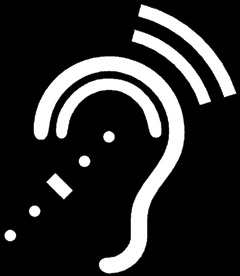- Home
- Archive -Aug 2009
- Listening now

Listening now
- In :
- Personal Growth
August 2009
By Jamuna Rangachari
The simple skill of listening helps cultivate better relationships, thereby enhancing your work life, and enriching your life
You will learn more only if you listen attentively to the others,” my daughter’s music teacher told her in the first standard and explained how the practice of playing the talam (beat) when the musician sang was to convey they were active listeners. “So, even for a concert to be good, we need to tune ourselves to be good listeners,” he summed up.
While not all of us may aspire to be active listeners of music, maybe it is time we question if we are good listeners of anything.
Coming closer
“Papa, see my drawing,” Shubham said and went running to his father who had returned home from work. Answering his cellphone and nodding absently, his father walked ahead. The poor little boy was broken-hearted.
This is an everyday occurrence in many homes. Many relationships falter and totter due to lack of listening. The hurts of little children are after all, just mirrors of what we all go through.
Leadership
“There is no point in telling him (the boss). He won’t listen,” said Mr Khanna (name changed) when grappling with a personal problem, which required some time off from work.
 |
This again is quite widespread. The more control a person perceives he has over another, the more he fails to listen. Unfortunately, in today’s world, most people associate leadership and control with speaking confidently and authoritatively. However, as any employee or even customer will tell you, it is listening, which is the key to effective leadership and management. After all, if one does not know what the problem is, how can we ever find a solution?
Why?
The fact is, often, we want to present only our point of view and are not interested in listening to others. Therefore, either we stop listening to the other person or we interrupt him at the first opportunity. Further, ego, conditioning, and prejudice are rampant, which block our natural ability to listen completely. If we were to change the equation, and adopt a new approach to life, we will see the power of listening in personal and professional relationships.
How?
We have a plethora of personality development courses today such as communication skills, public speaking, and voice modulation. However, have we ever paused to think that all we need to do is lend our ears and minds to another? As in most cases, we do not even know that we are not listening. Once we recognise the need to be better listeners, like all other skills, we need to apply some simple techniques to become what we wish to be.
Be a receptor
We spend a lot of time working at ignoring all of the information thrust at us in this modern age. It therefore becomes important to change our physical body language from that of a deflector to that of a receiver, much like a satellite dish. Our faces contain most of the receptive equipment in our bodies, so it is only natural that we should tilt our faces towards the channel of information. It must move and give the range of emotions that indicate whether you are following what the speaker has to say, and it must become an active and contoured catcher of information.
Further, one should maintain eye contact and pick up the non-verbal signals that all people send out when they are speaking. Essentially, our eyes help complete the communication circuit that must be established between the speaker and listener.
Stop talking
It is extremely difficult to receive information when you are sending information out at the same time. A good listener should stop talking and use receptive language instead. One can use words and phrases that follow and encourage the speaker’s train of thought. One can then move to asking questions, instead of giving one’s opinion on the information presented. Truly, it is a classic listening skill to use our faces as a moving receptor of information rather than as a broadcaster.
Pay attention
Pay 100 per cent attention to what someone is trying to tell you. Stop all other activities like answering your mobile, watching TV, or even staring vacantly into space.
Do not interrupt
Most of the time, we are so keen to convey our point of view that we wait for the moment when we can interrupt to put forth our own point of view.
Respond and repeat
Respond and convey your understanding. Repeat what you have heard so it is clear that you have understood. It is good to ask open-ended questions that are difficult to answer with a simple yes or no, for instance, “How could we do this?”, or “What do you think?” These help the speaker talk more and the more people talk, the clearer our understanding would be. Additionally, if you repeat what you heard, there are minimal chances of misunderstandings and incomplete communication.
 The hurts of little children are after all, just mirrors of what we all go through |
Have an open mind
An open mind is a mind that is receiving and listening to information. You cannot fully hear the speaker’s point of view or process information when you argue mentally or judge what the speaker is saying before they have completed.
Convey your respect
Show that you take other people’s views seriously. We need to do this by adjusting the tone of our voice and choosing words to show that we understand and empathise with them. The basic ground rule here, is not to ask questions which put people on the defensive, but instead to ask for their advice and feelings.
Essentially, an effective listener listens to understand the central idea and tries to be one with the speaker throughout the exchange with his body language, eye contact, and entire personality. Ultimately, all of this rings true only if it comes from within.
Empathy – the core of listening
No matter how we cultivate the skill, ultimately, it is about how we empathise with the other. We need to listen not just with our ears, but also with our heart and mind. If we work on this, we would be fostering win-win communication creating an atmosphere of trust, honour, and respect.
In sum
Zeno of Citium said, more than 2,000 years ago, “The reason why we have two ears and only one mouth is that we may listen more and talk less.”
How true! After all, how can we learn unless we listen? The reward for listening, is wisdom. It is time for us to decide to use not just our mouths, but our ears and our entire being for better communication and wisdom.
,br> We welcome your comments and suggestions on this article. Mail us at editor@lifepositive.net
To read more such articles on personal growth, inspirations and positivity, subscribe to our digital magazine at subscribe here
Life Positive follows a stringent review publishing mechanism. Every review received undergoes -
- 1. A mobile number and email ID verification check
- 2. Analysis by our seeker happiness team to double check for authenticity
- 3. Cross-checking, if required, by speaking to the seeker posting the review
Only after we're satisfied about the authenticity of a review is it allowed to go live on our website
Our award winning customer care team is available from 9 a.m to 9 p.m everyday
The Life Positive seal of trust implies:-
-
Standards guarantee:
All our healers and therapists undergo training and/or certification from authorized bodies before becoming professionals. They have a minimum professional experience of one year
-
Genuineness guarantee:
All our healers and therapists are genuinely passionate about doing service. They do their very best to help seekers (patients) live better lives.
-
Payment security:
All payments made to our healers are secure up to the point wherein if any session is paid for, it will be honoured dutifully and delivered promptly
-
Anonymity guarantee:
Every seekers (patients) details will always remain 100% confidential and will never be disclosed
